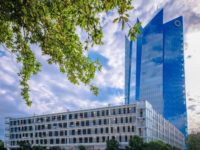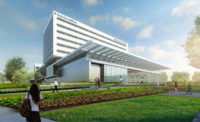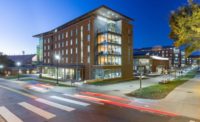Multi-level Sports Complex Repurposes Historic, Single-story Building

Considered the nation's first multi-level sports complex, HyVee Arena adaptively reused the historic Kemper Arena's single-level venue transforming it into a modern, four-level, multi-functional, 10,000-seat recreational facility in Kansas City, Missouri. Listed on the National Register of Historic Places, the arena's renovations needed to meet aesthetic standards, as well as functional and energy efficiency goals.
As a single source solution to Tubelite Inc., Linetec provided both the high-performance architectural coatings in the historically approved color and the thermal improvement services for HyVee Arena's new entrance, storefront and interior aluminum framing systems. Viracon's glass further enhanced the aesthetic and the glazing systems' high solar, thermal and optical performance.
* Expansion and renovation adds full floor and natural light *
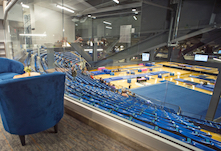
Foutch Architecture and Development (Foutch A+D) invested more than $39 million in the arena's infrastructure to repurpose the building. Working with McCownGordon Construction, the building owner and design team devised a solution that inserted a second floor in the middle of the existing facility.
According to McCownGordon Construction, "The construction of the facility was complex due to the addition of the new structural upper sport floor over the existing lower arena sports floor and seating. The renovation also included enhancements to the interior environment for the concourses, offices and retail spaces by adding 17 exterior windows. The north and south lower entrances were also renovated to make them more accessible and inviting."
Mike Woolley, project manager with McCownGordon Construction, elaborated, "The owner/designer wanted to get as much natural light into the building as possible. With the east and north elevations limited by historic guidelines, they had to turn to the south and west to add the new windows. On the interior, there used to be three or four walls blocking the light. We used interior glazing systems to extend the light all the way through to the corridor and into the interior suites that look out over the playing area."
* Custom colors meet historical aesthetics *
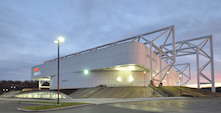
To maintain the architectural heritage of the facility's exterior, Woolley added that the design team used Viracon's VE1-2M "low-iron glass and vertical, white frit silkscreen pattern" combined with Tubelite's aluminum framing "set flush with the existing conditions" and finished in a "Super White" color custom-matched, blended and applied by Linetec to create the desired effect.
After analyzing the finish on the former Kemper Arena's existing glazing systems, Linetec's in-house color laboratory customized a "Super White" color to match the owner's and historic review committee's standards. "Even with more than 50,000 in our library, sometimes, only a custom-match will work, especially for historical projects," said Linetec's marketing manager, Tammy Schroeder, LEED Green Associate.
She described Linetec's proprietary process, "Our color-match computer, called a spectrophotometer, scans color samples and provides the recipe of tints and bases to precisely match the color sample. Using this equipment, and years of experience, our lab technicians can match anything from a piece of metal, to a section of masonry, to a swatch of fabric."
Schroeder continued, "Having in-house blending capabilities allows us to better meet our customers' needs in hours not days or weeks. Typically, custom sample and color match requests are processed and completed in 24 to 48 hours for most in-house blendable colors."
* High-performance finishes for a high-traffic arena *
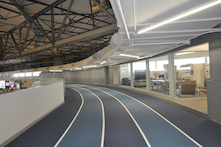
Upon approval, Linetec produces the coating in its blending "kitchen" and applies it under quality-controlled conditions at its facility. For the new Tubelite aluminum systems on the HyVee Arena, Linetec relied on Sherwin-Williams Fluropon 70 percent PVDF resin-based architectural extrusion coatings to meet the specified performance and application.
According to Schroeder, "These Fluropon coatings offer the ultimate protection in building performance. These finishes exhibit outstanding resistance to humidity, color change, chalk, gloss loss and chemicals, and ensure a long-lasting, durable finish. No other coating system can withstand the rigors of nature and time like those based on the 70 percent PVDF resin-based coatings."
All of the 70% PVDF resin-based coatings applied by Linetec meet the industry's stringent standards for exterior coatings – the American Architectural Manufacturers Association's AAMA 2605. After providing a lifetime of constant use in a high-traffic venue like HyVee Arena, the coatings can be removed and Tubelite's aluminum framing material can be recycled or reused.
* Energy-efficient entrances and enduring exteriors *
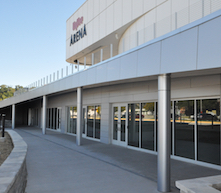
In addition to the durable and sustainable qualities of the coatings on HyVee Arena's new glazing systems, Linetec also applied the thermal strut on Tubelite's Therml=Block entrances. Adding insulating, thermal, polyamide strut to aluminum framing members separates the inside and outside metal, which greatly enhances the entrance system's thermal performance. This thermal break reduces the amount of heat transfer, therefore saving energy and increasing occupant comfort.
"The thermal performance was really important as Foutch A+D was not only the designer, but also the owner," emphasized McCownGordon Construction's Woolley.
"We worked early on with Foutch Brothers' architectural team to select systems, finishes, glass color and silkscreen, energy analytics, etc. Tubelite and Viracon were the basis of design for this project," said Tubelite's representative, Doug Urich of Archon Fenestration Technologies. "We also worked closely with Byers Glass to help secure the project."
"It was an overall challenging project, but we were able to work together and get it done," acknowledged Kyle Kroh, project manager with Byers Glass. He noted that one of the ways Tubelite helped overcome the challenges was by "installing hardware on the doors ahead of time." He added that the finished material "showed up in good shape when they said it would."
In total, Byers Glass and Mirror installed 62 leafs of Tubelite's Therml=Block entrances and 4,800 square feet of T14000 storefront on the exterior, and 15,800 square feet of aluminum framing systems on the interior. Viracon glass was used for these new systems and its insulating laminated glass remained unchanged on the former Kemper Arena's existing glazing systems.
* Cost-effectively revitalizing an aging icon *
Originally designed by Helmut Jahn, the Kemper Arena was completed in 1974 on the site of the former Kansas City Stockyards, just west of downtown in the West Bottoms. The building was revolutionary at the time in its simplicity and the fact it did not have interior columns obstructing views. It underwent remodeling the 1970s, '80s and '90s. Around 2010, city leaders in Kansas City began discussing the future of Kemper Arena.
Troy Schulte, City Manager of Kansas City, remembered asking: "What do we do with this 40-year-old arena that's functionally obsolete, costing the City over $1 million a year to operate, and I was looking at $6 to $10 million to tear it down?"
Steve Foutch, CEO of Foutch Brothers, reacted, "When some historic friends came in and said that 'They're planning on tearing down Kemper.' Is there any way I could figure out a way to help save it?" He turned to Elizabeth Rosin, principal of Rosin Preservation, for assistance.
"We were so excited when Steve called us to help with this project. We love a challenge. It was a way to help save a building that would otherwise be lost," said Rosin. "He knew that being able to use historic tax credits was going to be critical to making that project work."
She continued, "We had to go back and re-think why this building was important. The thing that kept coming back in all the conversations that we had about Kemper, is that everybody has a personal connection. They all have some reason why they love Kemper Arena. Why take all of that embodied energy and put it in the landfill when it can be put back to good use?"
Through their efforts, Rosin Preservation helped secure Kemper Arena's listing on the National Register of Historic Places. As a result, the project received more than $16 million in state and historic tax credits toward its renovation.
* Community spaces can make a difference *
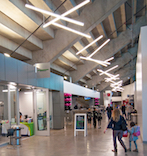
"It's really easy to go build a new building to make it exactly the size and shape and complexity that you want. With historic, you only got what you got. You have to live with the structure you're given," observed Foutch. "We had to fit the sizes, the shapes, the orientations of these courts to maximize the space."
Renovation began at the arena in Sept. 2017 and was completed in Aug. 2018. Two separate floors in the improved and expanded HyVee Arena include more than 84,000 square feet of column-free space of 12 hardwood maple floors. Sports agility, fitness facilities, health care services, retail, entertainment and dining services surround the two hardwood court floors. Above the second level of courts is one of the largest indoor practice tracks at 350 meters in length.
Standard membership includes access to onsite retailers, restaurants, businesses, the fitness center, locker rooms, free classes, conference room rental and the five-lane Mondo Indoor Track. Members also can book open court play on the four collegiate/NBA courts on the lower level or the eight high school/collegiate courts on the upper level. Basketball, pickleball, volleyball and futsal leagues maintain their own schedules. Tournaments and special events are hosted throughout the year. With the exception of two holidays, the arena is open 6 a.m. to midnight every day.
Beyond the building itself, Foutch looks to a larger view of success: "This arena hopefully will be a new destination. There's a lot here to do with helping the urban youth. We can help out thousands of kids... The biggest compliment is obviously someone will say, 'This really made a difference. It made a difference in my kid's life. It made a difference in the stockyards district.' There's a lot of different answers, as long as we've made a difference. That's the best part."
Looking for a reprint of this article?
From high-res PDFs to custom plaques, order your copy today!



